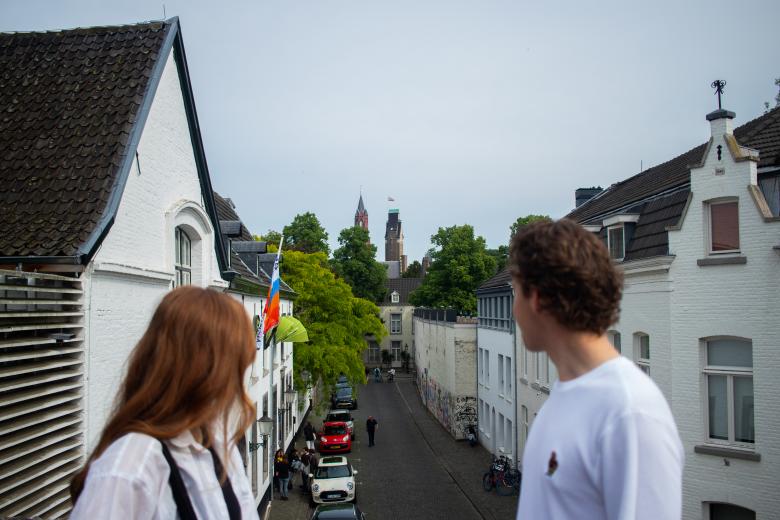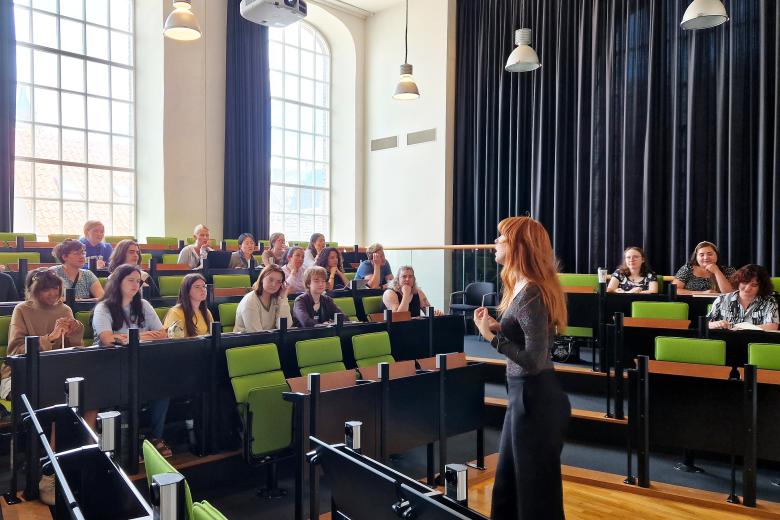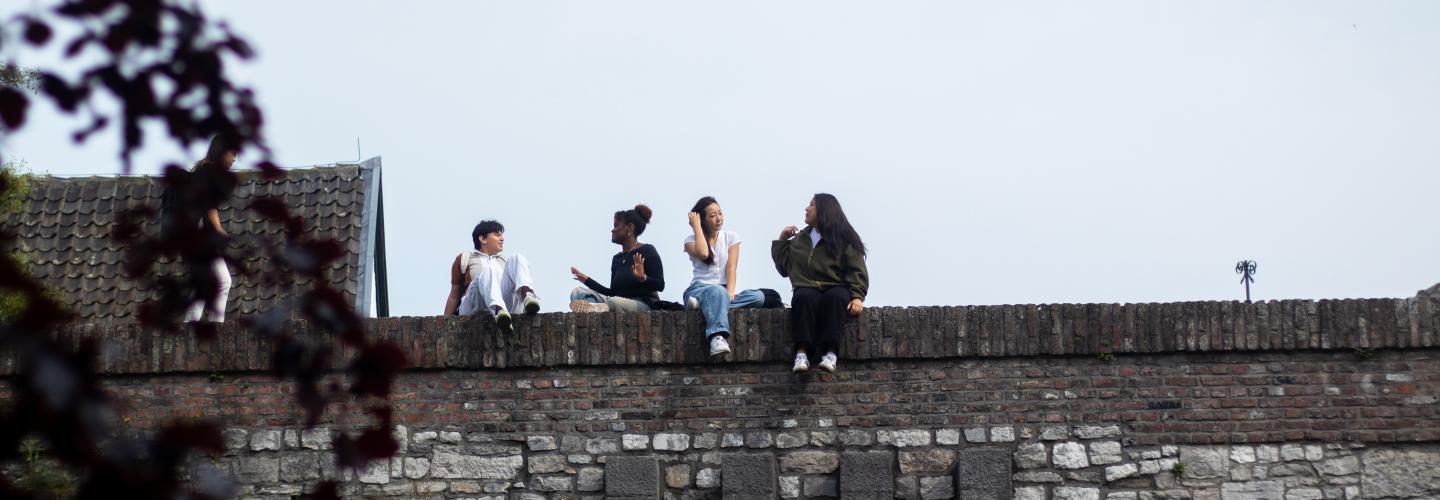Why this programme?
The Business & Economics in Europe programme is designed to give students a greater understanding of the international business practices in Europe and the economic policies of the European Union. What better place to study business and economics than in Maastricht, the Netherlands? Maastricht gained international fame as the birthplace of the Euro, and is located between the major economic centres of Brussels, London, Frankfurt and Amsterdam, making it the ideal place for educating and training the global business leaders and economists of tomorrow.
At CES we have a small team of young-hearted, dedicated people ready to help you, so you can focus on the things that really matter during your stay abroad.
Fast facts
- Apply your business and economics knowledge beyond the classroom
- Combines strong academics with integrated field trips and unique hands-on experiences
- Choose from more than 400 bachelor courses in English
- Quarter, semester, year
- Direct enrolment
World-class business & economics school
Students in the Business & Economics in Europe programme are directly enrolled at Maastricht University (UM) and take classes at the School of Business and Economics (SBE), which is accredited by the European EQUIS, the American AASCB and the prestigious AMBA. This Triple Crown accreditation is held by less than 1% of business schools in the world. Students can also choose courses from the Center for European Studies (CES).
International summer internships
The Center for European Studies is partnering with The Intern Group to provide students with the opportunity to arrange a professional internship in their desired career field. Students can take their global experience to the next level by completing an international internship after studying abroad in spring at Maastricht University.
Join our programme
Would you like to join our programme? Please take note of the following programme dates:
| Fall 2025: | Spring 2026: |
Friday 15 August - Saturday 20 December | Friday 16 January - Saturday 6/13 June* |
*Depending on class selection
Tuition and fees
Find detailed information about tuition and housing fees, estimates of additional expenses, payment methods, and our cancellation policy all in one place.
Courses and curriculum
Head over to the courses and curriculum page for an overview of all available courses.
The School of Business and Economics immersed me in a global community. The discussion-based courses with diverse perspectives pushed me outside my comfort zone, creating a transformative experience that will continue to shape my future.
Mackenzie Simon | University of DenverIntroduction
The programme starts with a two-week introduction, which includes CES services, the Dutch Discovery Trip, a tour of Maastricht and the surrounding area, UM orientation, a Problem-Based Learning (PBL) workshop, a cultural awareness lecture and integration into Dutch student life.
Dutch Discovery Trip
Our Dutch Discovery Trip is an exciting journey through the Netherlands, where students will immerse themselves in culture, history and unique experiences at iconic sites such as Kinderdijk.
Paris Cultural Weekend
Students will discover the grand boulevards and renowned architecture of the City of Light, and experience its rich history, artistic beauty and cuisine.
Belgian Day Trip
This trip is filled with exploration and charm. After witnessing some of nature’s most stunning underground treasures at the Caves of Han, students will travel to the rolling countryside for a guided tour of the historic Val-Dieu Abbey.
Credits
Maastricht University uses the ECTS (European Credit Transfer System) to measure academic progress. Maastricht University courses typically have between 5-12 ECTS credits. How ECTS credits transfer depends on a student’s home university or college. Generally a 5-6.5 ECTS course is the equivalent of a full semester course (3 American credit hours).
You can earn a minimum of 24 and maximum of 32 ECTS credits per semester at CES. This is considered a full semester workload and usually transfers back as 15 American credit hours. CES advisors help students select classes to meet the requirements of their home university.

High academic standard
CES programmes are designed for enthusiastic and intellectually curious students dedicated to expanding their academic horizons while abroad. To ensure that students do well, CES offers extensive academic advising, workshops and regular monitoring. Maastricht University uses Problem-Based Learning (PBL), a student-centered teaching approach. Small groups of students (12-15) work on academic or practical cases prepared by their professors. Faculty act as guides to students who are in charge of their own learning and are expected to be committed, active and self-motivated.

Workload
During a regular course (5-6.5 ECTS credits), students spend an average of 4-6 hours in class per week. For every hour in class students are expected to spend an additional 2-3 hours on study. The total workload for two regular courses or one intensive course is around 40 hours per week.

Admission requirements
Acceptance to the open enrolment programmes is competitive and early application is recommended. While most students participating in our open enrolment programmes are undergraduates at the junior or senior level, applications by motivated students at the sophomore and/or freshman level with a good GPA will be considered too.
You should have a minimum GPA of 3.0 in order to apply for a CES open enrolment programme. If you have a lower GPA you can request to be considered if you can show a recommendation from a professor or academic advisor at your home university or college with specific details about your academic development so far.
Applicants must be proficient in English. Non-native speakers are required to demonstrate proof of English language proficiency.
Students with an International Baccalaureate or European Baccalaureate diploma are exempted, as are EU-nationals. International students who are enrolled as fulltime students at university or college in a native-speaking country where English is the language of instruction are also exempted.
All other prospective students must present a current TOEFL (Test of English as a Foreign Language) or IELTS (International English Testing System), score before they can be admitted.
Your TOEFL test score has to be at least:
- 575 points (paper-based version)
- 230 points (computer-based version)
90 (internet-based version)
Your IELTS test score must be at least 6.5.
Admission and registration
Application procedure
Complete and submit the online application and send all additional information mentioned below via email to your coordinator. Your CES coordinators will contact you within a week after receiving your application and additional information to assist you in the registration process and the preparations for your stay in Maastricht.
Additional required information
- Official transcript
- Letter of recommendation from teacher or study abroad advisor
- Motivation letter
- One full colour passport picture (digital, in jpeg format)
- Scan or a clear copy of your passport (information page with photo and any other pages with stamps etc)
Regarding the criteria for the motivation letter, CES staff are interested in what inspires a student to apply. Why are they drawn to this programme, to Maastricht University or to Europe? Students may want to highlight academics and certain courses, the culture, history or personal goals. The motivation letter should be 1-2 pages in length.
An academic letter of recommendation is a one page letter (approximately) that highlights a student's academic background, character, academic or career goals and other related interests or achievements. The letter expands upon a student's record or transcript, providing insight into what kind of student they are and their suitability for the programme. It should be written by a professor, academic or study abroad advisor.
Please note that once your course list is finalised you will receive a course approval form which you will need to fill in with the help of your home institution.
Application deadlines
- Spring: 1 October
- Fall: 1 April
Contact
Jil Buchheim
International Relations Officer
Tuesday - Friday
+ 31 43 388 5254
